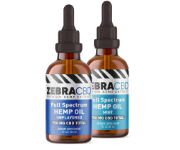
In 1913, Thomas Barlow Wood, a professor of agriculture at the University of Cambridge, published a book called The Story of a Loaf of Bread. Because it’s public domain, there’s an audio version of The Story of a Loaf of Bread on YouTube (35 views and counting) for your listening pleasure.
While it’s doubtful the book will be turned into a blockbuster movie, Barlow’s more notable accomplishment might make for a more compelling story. You see, 17 years earlier, in 1896, Wood, along withW. T. Newton Spivey, M.A., and Thomas Hill Easterfield, M.A., Ph.D., was the first to isolate the cannabinoid cannabinol (CBN). They discovered that, after prolonged storage (especially at high temperatures), tetrahydrocannabinol, or THC — the psychotropic ingredient in marijuana — turned into CBN. It’s thought that this chemical transformation was due to the poor-quality transportation and storage conditions of the 19th century.
CBN ... allows you to get potentially comparable medicinal benefits to THC without the high sensation. This is why people are so excited about CBN.
Originally, the team of researchers thought it was CBN that was responsible for the intoxicating, psychoactive effects of cannabis. Later, it was discovered that THC was the “intoxicating culprit” and that CBN had only about 10% of the psychoactive effects of THC — which means you’d have to ingest a whole lot of CBN oil to experience any euphoric effects.
CBN vs. THC
CBN, being a byproduct of THC, has much the same properties, but to a lesser degree. Therein lies the potential opportunity of CBN that many are so excited about. Because here’s the thing: While CBD works great for millions of people around the world, it’s pretty much universally accepted that CBD and THC together are extremely effective.
But that match is not practical for many people because of the still restrictive laws surrounding THC, people’s perception of it, and the fact that many people simply don’t want to experience the intoxicating sensations of THC.
CBN and CBD: The Ideal Match?
So what is CBN, and why does this cannabinoid have the potential to be a gamechanger in the cannabis world? In order to explain, let’s look at how both THC and CBD interact with our endocannabinoid system (ECS).
The ECS acts on multiple systems in the body, including the cardiovascular, respiratory, reproductive and nervous systems. It sends out neurotransmitters throughout our bodies to check whether everything is running smoothly. If it finds a problem, it sends out instructions on how to fix it.
The two main cannabinoid receptors in our ECS are known as CB1 and CB2. The CB1 receptor impacts your central nervous system, which means it affects your mood, memory processing, motor control, speech, sensations, thoughts, etc. Your CB1 receptor also influences lung, liver and kidney function.
The CB2 receptor is concerned with your body’s natural defense system: your immune system, which means it’s crucial in preventing infection and disease. The CB2 receptor also helps with your hematopoietic stem cells, which produce new blood cells.
CBD and THC interact with your CB1 and CB2 receptors differently. CBD does not have a strong affinity for CB1 receptors, and it does not directly activate CB2 receptors. It is thought to interact with the body through other mechanisms which indirectly impact both the CB1 and CB2 receptors.
THC, on the other hand, binds to both the CB1 and CB2 receptors. It mimics the endocannabinoids produced by your body and activates the receptors. This can produce both positive as well as less than desirable results. For example, THC has the potential to reduce your pain, but it can also cause paranoia.
What Does CBN Do?
Like THC, CBN binds (although not as strongly as THC) to both CB1 and CB2 receptors (more strongly to the CB2 receptor), which allows you to get potentially comparable medicinal benefits to THC without the high sensation. This is why people are so excited about CBN.
So, what are the medicinal benefits of CBN?
A 2019 study focused on CBN, CBD, and CBC (cannabichromene). It concluded that the three different cannabinoids “may provide analgesic relief for chronic muscle pain disorders…” — an indication that a potential benefit of CBN could be pain relief.
A 2012 study found that rats treated with CBN demonstrated a significant increase in both quantity and duration of feeding. Depressed, stress and chronic disease can cause a decrease in appetite. Age and a slowing metabolism also can lessen the desire to eat. The hope is that CBN could one day be an all-natural alternative to appetite stimulant drugs. MRSA is a bacterial staph infection that has become resistant to many of the antibiotics designed to treat it. A 2008 study in which CBD, CBC, CBG, THC and CBN were tested. found that all five cannabinoids “showed potent activity against a variety of methicillin-resistant Staphylococcus aureus (MRSA).”
Studies have also shown that CBN decreases the heart rate without decreased blood flow. A lower resting heart rate is a sign your heart is working as it should. Your heart keeps a regular beat and doesn’t have to work too hard.
CBN has been hyped for its sedative effect. (It’s often referred to as the “sleepy cannabinoid”); but, at this point, the science doesn’t back up that claim (although there is plenty of anecdotal evidence that CBN promotes healthy sleep). Many articles mention a study by the cannabis science and technology company Steep Hill, which compared CBN’s sleep effects to the prescription drug Diazepam. However, Steep Hill later published the disclaimer, “Initially, it was reported that CBN was a promising adjunct in the treatment of insomnia, but with the advent of a few small trials, sedative qualities have not been observed. Further study is required. Current evidence demonstrates that CBN reduces chronic pain, inflammation and is anti-bacterial, while having little or no psychoactivity, making it a promising, alternative treatment to d9THC.”
Unfortunately, there is no way for cannabis breeders to produce a high-CBN strain of cannabis because CBN results from environmental effects that act on the cannabis plant. The only way to speed up CBN production in a cannabis harvest is to age it while exposing it to heat, oxygen and sunlight. More time to harvest means CBN can be rather expensive — especially CBN Isolate (pure CBN with no other cannabinoids, terpenoids, dietary antioxidants, etc. That said, it will be exciting to see what the future holds for CBN as more studies emerge on how it can potentially contribute to human well-being.









